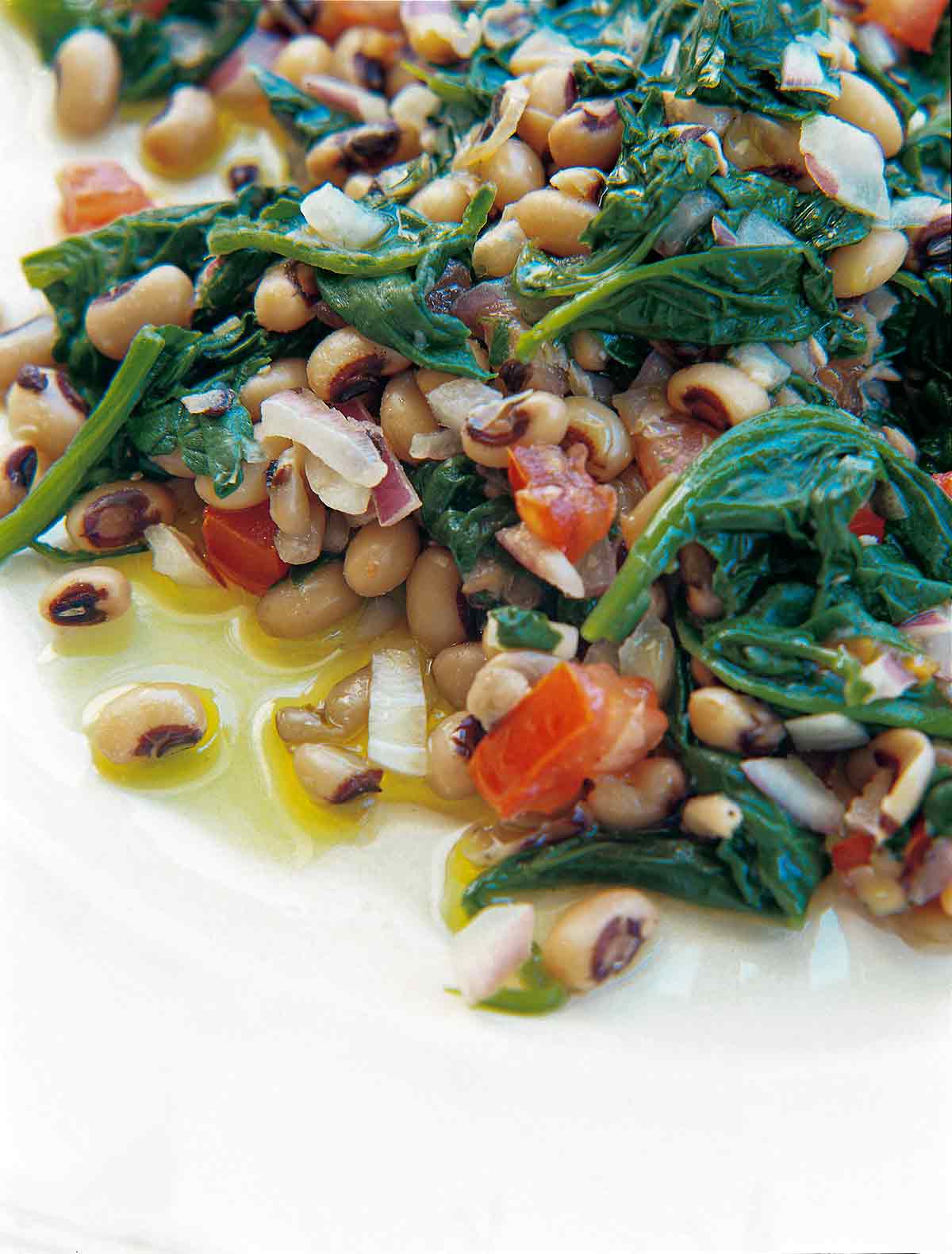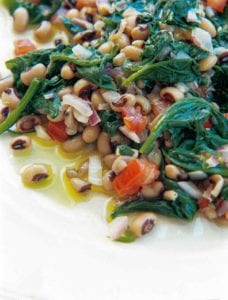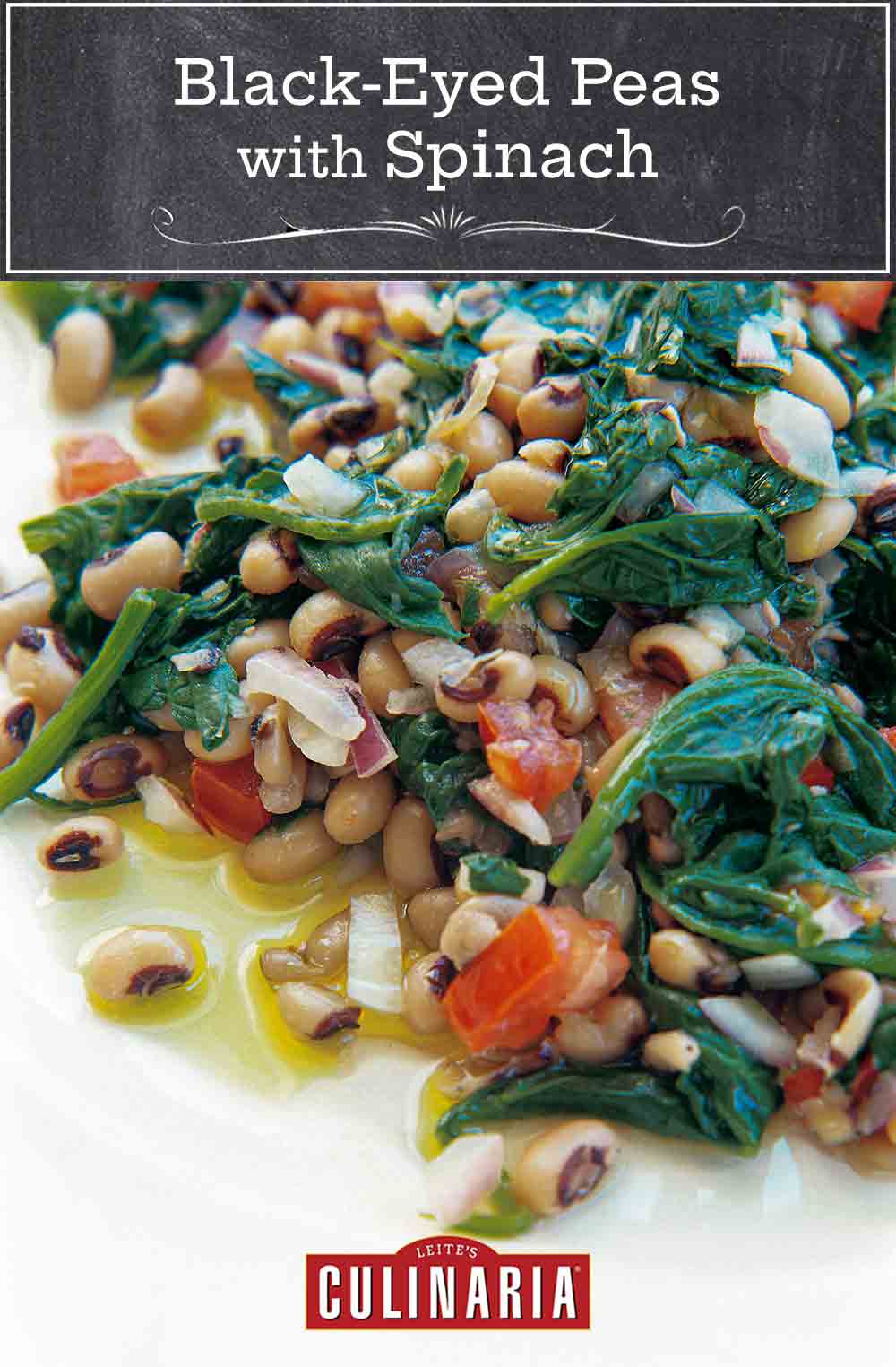
We were skeptical about this healthy-sounding, if not quite traditional approach, to the South’s New Year’s good-luck charm of black-eyed peas. But after one taste of this warm, soupy salad of sorts, we say forget the luck. Just pass more of these peas, please.–Renee Schettler
Black-Eyed Peas with Spinach FAQs
Funny you mention that, as a few of our testers said the same thing. Even though they’re salted before serving if you don’t care for raw onions, you still might prefer them cooked. Go ahead and give them a quick sauté if you feel that you’ll like them better that way. Or, if there’s a mild onion that you don’t mind raw (green onions or maybe a shallot), use that instead.
You’ll notice that the peas go through a long simmer before salt is added at the end, instead of during the entire boil. This keeps the peas from cooking up firmly—in this dish, the desired texture of the peas is creamy and soft.
We like the way that spinach gets meltingly smooth but if you don’t have it on hand and don’t want to leave the house, most other greens will work. A handful of kale, purslane, Swiss chard—anything that wilts quickly will be fantastic.

Black-Eyed Peas with Spinach
Ingredients
- 1 small onion, diced
- 1 teaspoon salt, plus more to taste
- 2 small tomatoes, diced
- A handful chopped flat-leaf parsley leaves
- A couple lemons, cut into quarters
- 1 1/2 cups black-eyed peas, soaked overnight
- 6 cups firmly packed spinach leaves
- Extra-virgin olive oil, to serve
Instructions
- Place the onion in a small bowl, add enough cold water to cover, and sprinkle with the salt. Let stand for about 30 minutes or so. Rinse and drain well, squeezing out the excess water with your hands, and place the onion in a small serving dish. Place the tomatoes, parsley, and lemons in separate small dishes.
- Meanwhile, rinse the soaked peas and place them in a large saucepan. Add enough cold water to cover by an inch or two and bring to a boil. Skim any scum from the surface with a slotted spoon. Drain the peas, return them to the pan, and cover with cold water. Bring to a boil again, decrease the heat slightly, and cook, uncovered, for 1 to 1 1/2 hours, until the peas are soft but not mushy. You want the water level to always remain just above the peas; if the water evaporates, add extra hot water as necessary.
- Toward the very end of the cooking time, season the peas with salt. Tear the spinach into bite-size pieces, toss them into the pan, and cook just until the spinach wilts, another 3 to 5 minutes.
- Using a slotted spoon, divvy the peas and spinach among individual bowls, including just a spoonful or so of the cooking liquid. Place the onion, tomatoes, parsley, and lemons, along with the salt, pepper, and the olive oil, on the table and pass them separately so each person can dress their peas and spinach as desired.

Explore More with AI
Nutrition
Nutrition information is automatically calculated, so should only be used as an approximation.
Recipe Testers’ Reviews
I have to admit that I’ve never cooked black-eyed peas with spinach before. After this, I’ll cook them again. This was a very easy and satisfying dish. I appreciated the smoothness of the peas and then the olive oil and lemon dressing.
Next time I make this, I might lightly sauté the onions before dressing the peas only because I don’t care for raw onions.
I think this makes a simple, rustic dinner for almost any time of year. The barely cooked spinach and soft, rich black-eyed peas come together with the bright lemon juice and acidic tomatoes perfectly. My only problem is that I’d rather not have raw onions. In the future, I’ll sauté or caramelize them before serving.
I’m also glad that I checked the peas about 15 minutes early because they were done enough by then, but that may have more to do with the freshness of the local peas than anything else. If I was going to make this all my own, I’d probably cook a garlic clove with the peas and add hot sauce at the table to go with the other condiments.
Being from the South, I’m a huge fan of black-eyed peas and spinach, and this dish didn’t disappoint!
I liked the idea of wilting spinach in the peas; it’s a great way to add color and extra nutrition to the dish. The tomatoes on the side were fantastic as well. I usually add diced tomatoes to the peas when they’re just about cooked, but never had them raw on top of the peas. I liked the freshness of this method. The salted onions were a tasty addition to this recipe as well. My grandmother used to serve whole, raw green onions as a condiment at every dinner and this addition of the diced onions really brought back to mind that fresh onion punch that I loved on her dinner table.
The only thing I’d change about the recipe is the cooking time—my peas were ready to eat after only 50 minutes of cooking, not 1 1/2 hours.
This is a very good make-ahead supper for those nights where you’re busy running here and there. Overall, the recipe as-is was a little bland for me. Next time, I’d season the cooking liquid for the beans with maybe a quartered onion, some garlic cloves, and a sprig of rosemary or thyme. We ate the black-eyed peas with spinach warm with a little salsa and some cornbread.
I served this pea and spinach dish as an accompaniment to oven-roasted chicken and it paired very nicely. We found that the combination of the spinach and peas with the lemon juice, tomatoes, onions, and parsley worked very well.
Be careful not to overcook the spinach—a quick wilting is just the right texture for this dish. Salting and soaking the raw onions definitely helped remove some of their bite. We also liked the fact that diners can choose what they want to dress their spinach and peas with.
I like black-eyed peas but rarely cook them except on New Year’s Day as part of our traditional good-luck Southern meal. It’s nice to have another recipe and reason for serving them anytime.
I agree that this is a cross between a soup and a salad, and a nice change for black-eyed peas. Not sure why the author has you presoak and precook, as I’d never heard of using both methods at one time and think it’d only be necessary to do one or the other. But being the dutiful tester that I am, I did both as stated. I did end up with a nice lunch and would make this one again. Next time I’ll probably just use one of the methods stated above.














Ah, no, Southerns don’t eat spinach with black-eyed peas on New Year’s Day. They (we) eat collards.
Thanks, Thomas. We should have been more clear that this is a variation and that only the black-eyed peas are meant for good luck. We’ve clarified that in the recipe. Thank you for bringing it to our attention.
Has anyone served this dish cool or at room temperature?
For my close relative I might add a subtle pinch of cumin and/or coriander. This recipe looks very adaptable for other flavorings. It could lean toward Italian, Spanish, Mexican, Caribbean (lime/cilantro), or even Asian. Toss in some Spanish chorizo,…..
We haven’t tried it cool, Rita, but I think it would do well at room temperature. And yes, absolutely, you can play around with the flavors. Do let us know what you ended up choosing to do and how it turned out.